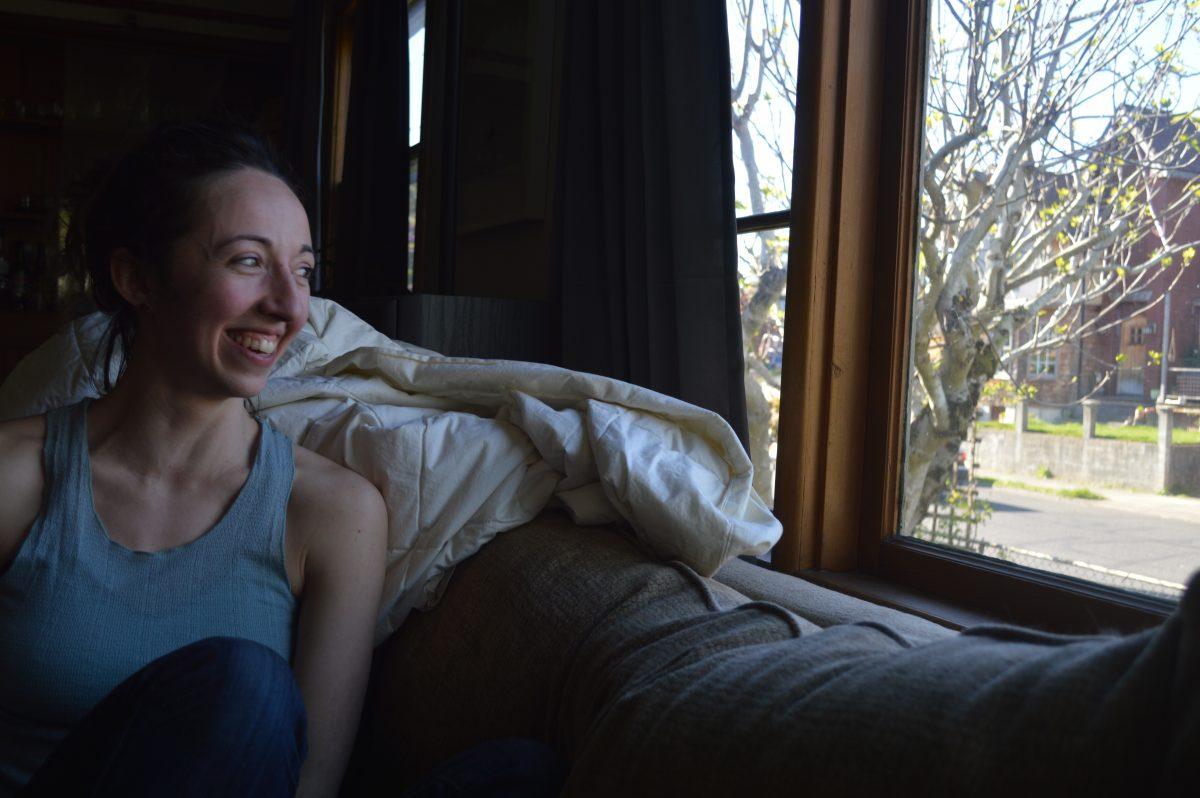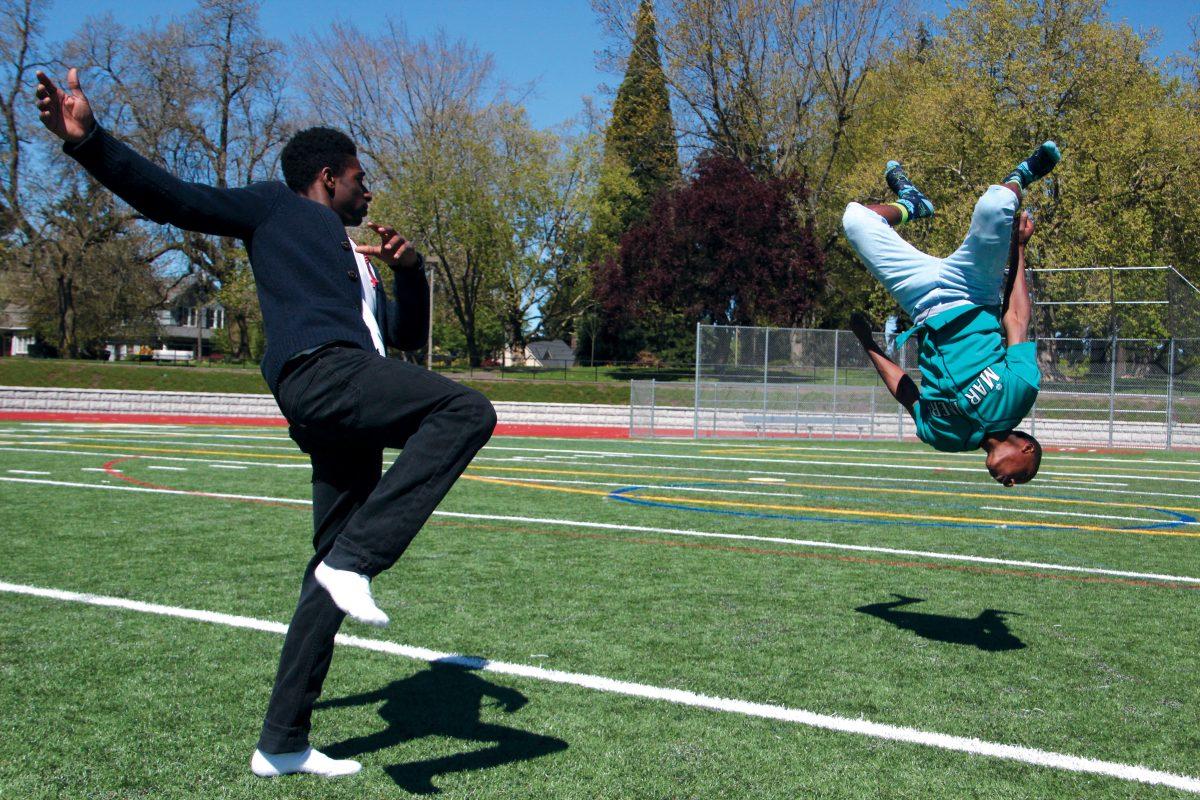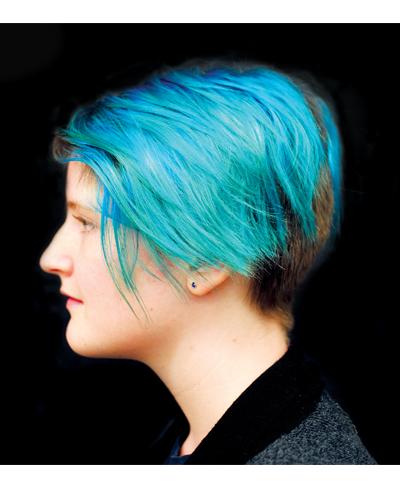As a 22-year-old Jocelyn Edelstein took stepped off a plane in Rio de Janeiro; she was whisked away in a taxi, a blur of narrow streets and vibrant houses around her.
The smell, she remembers, was good and bad at the same time, a lush fusion of jungle, garbage, barbeque and sweat. “This is where I need to be,” she said to herself. “This is right, this is right, this is right.”
It was where Edelstein experienced co-existing opposites, in herself and her environment – a perfect place to plant a seed for a new chapter in her life.
Through her travels in South America, Edelstein found a second family in a group of teenage dancers, a new perspective on life and a determination to achieve a lifelong goal.
Almost 10 years later, the 2001 Grant High School graduate will have to grow comfortable with this story coming to a close. Her feature-length documentary, Believe the Beat, which follows the transformation of passionate teens to admired dancers in Rio, will be released this summer. That’s when a new journey in Edelstein’s life will begin.
But with the family she’s gained, Rio will always have a place in her life.
As an only child, Edelstein developed a welcoming nature and engaging curiosity. She became accustomed to adult conversation.
Maggie Edelstein, Jocelyn’s mother, recalls her daughter going to the park and introducing herself to other children, quickly making friends. At dinner parties with her father, she initiated reading poems. “She was very comfortable and engaging,” says Bob Edelstein. “A risk taker.”
At Rigler Elementary School in Northeast Portland, she and her friends created the World Friendship Club. Edelstein analyzed what their school could improve on environmentally and helped implement recycling bins across campus.
“I think that it was a big vision I had but I didn’t really know how to get people on board, and that again manifests itself a lot in filmmaking,” Edelstein says.
Her mother found that Edelstein “had the awareness of global issues and the need for everyone to come together.” She felt a responsibility to the environment around her.
In middle school, Edelstein started ballet. At Hollywood Dance Studio, Edelstein participated in bi-annual performances and attended ballet classes three times a week. Her goal was to be dancing on pointe shoe, the ability to dance on the tips of your toes in a ballet slipper, by her senior year of high school. She accomplished her goal by sophomore year.
High school was challenging for Edelstein. Although she had a supportive group of friends, she was overwhelmed. “I think being 14, 15, 16 and 17 are emotional years,” she says. “It’s a time of identity mining and so many different social structures and bonds are forged and tested in the high school environment.”
Edelstein had to balance the process of getting work finished and her perfectionist personality. She was sensitive to both the needs of others and to the potential of failure. “For Jocelyn, there was a pressure to conform, but to individuate (herself),” says her mother. “You’re going to get backlash from what’s expected.”
This was a recipe for heightened feelings. But amidst chaos, there was a safe haven for Edelstein – the theater department.
Grant theater teacher Chris Lane remembers helping Edelstein use her sense of movement to her advantage. “She was not as confident with her voice and I immediately picked up that she was a dancer. She moved. If she could do that, she could do anything.”
After high school, Edelstein enrolled in the theater program at Marymount Manhattan College in New York City. Her first day of school was September 10, 2001.
When 9/11 struck, the city became more overwhelming than it already was for her. Shaken, Edelstein finished her semester and returned to Portland to regroup.
She took six months off, working at a cafe and living at home. She then researched colleges and ended up at Fairhaven, an alternative program at Western Washington University in Bellingham. It was opposite from the fast-paced New York City.
At Fairhaven, she gravitated toward modern dance, hip-hop and capoeira and fell in love with the way movement could be used as a form of expression. She designed a major that incorporated dance, cultural studies and storytelling. She then received the Adventure Learning Grant, which allowed Edelstein to go abroad to the country of her choice and spend one year pursuing activities and participating in volunteer work relating to her major.
She chose Brazil, for its rich culture, and began teaching hip-hop and English to kids in Rio. She studied capoeira and other forms of Brazilian dance with teachers.
She planned to see the whole country, but something in Rio made Edelstein want to stay.
“It all felt very unexpected and beautiful and alive.” – Jocylen Edelstein
Edelstein’s first month was a frenzy of adapting, panicking and falling in love. She started teaching dance and English at a community center and understood only basic Portuguese. Figuring out how to communicate was exhausting.
Edelstein also taught dance classes in a favela, a slum near the volunteer house where she lived. The culture shocked her. “When I first lived there, and when you were in the favela, the traffickers made the rules,” she says. “Weapons were out and drugs were being sorted and there was a system in place.”
In Rio, it was prevalent. Edelstein experienced a new relationship between the police and the drug traffickers, which was volatile. Gunshots at night were frequent.
While teaching a dance class at a favela, Edelstein met Val, a woman whom she now considers family. Edelstein approached her after class and asked if she wanted to go dancing in Rio.
As she began to travel in Val’s circles and see the dance community through the eyes of a native, her connection to Rio strengthened. It also improved her Portuguese.
After meeting Val, a succession of events followed that led Edelstein to a park by the beach where she first saw the dancers that her documentary follows.
The first event was a dance class. During one of the classes, two men approached Edelstein and Val. “One in particular was very interested in what an American girl was doing in Rio,” Edelstein recalls. He became intrigued when she told him she was teaching dance classes at a community center and majored in dance.
They started dating after a couple of dance classes. “He was my Brazilian boyfriend and I was falling in love,” Edelstein remembers. The first thing he wanted to show Edelstein was his dance company.
Edelstein imagined the address would take her to a building. Instead, it led her to Flamengo Park, where a group of young adults was dancing on a concrete structure by the beach.
At night, a single light shined on the dancers. “It dawned on me that this is a group of teenagers and young adults training, but they’re training on their own,” she recalls. “They didn’t have any resources. They were just killing it.”
Edelstein observed the multiple dance groups, and eventually started to dance alongside them. Their dance form of choice was hip-hop and the roughly 25 young adults were captivated by the culture and how it could be used as a tool of expression and empowerment.
When she got to know the dancers individually, her relationship with her then-boyfriend ended. “All I wanted to do is dance with this group of people, but I wondered if it (was) still OK for me to be (there),” she says. After assurance from the group, Edelstein began forming the project of a lifetime.
She trained with the group three to four times a week. At the end of the day, everyone always walked each other home. “Everyone was protective of each other, which was really sweet,” remembers Edelstein.
On weekends, the group would go dancing at clubs and she became comfortable with freestyle dancing. The DJs often knew them, so a dancer would request a song and take over the dance floor.
After dancing with the group for seven months she gained the courage to ask if she could film their practices. Excited about the idea, the dancers jumped at the notion. After buying a video camera with the support of her parents, Edelstein began filming their process. “It all felt very unexpected and beautiful and alive,” she says.
After her first year, Edelstein returned from Brazil and studied filmmaking. “I watched as my friends evolved as dancers and began changing the hip-hop scene in Rio de Janeiro, as well as their own lives in the process,” she says. She realized she had to keep following the thread.
Edelstein returned to Rio four times in a span of 10 years to continue documenting her friends’ journeys. Her most recent trip was last summer with a professional film crew.
Edelstein filmed on her own until 2010, when she connected with a film editor and later two producers, one from Brazil. When the producer in Brazil saw her trailer, he was shocked that he knew the kids in the video, “We thought, ‘Oh my God, that’s destiny,’” she says.
In 2008, Edelstein met her now-husband Anthony DeMarco through scoring, the process by which someone composes music for a film. “I contacted him because I knew he made really good music. I thought maybe he’d be interested in volunteering his time,” she remembers. Edelstein hired him after a few meetings.
Both had automatic feelings for each other. DeMarco was attracted to Edelstein’s intuition and creativity. “She’s the most loving woman I’ve ever met,” he says.
But despite her ambition, the hardest aspect of making the film for Edelstein has been the patience and trust required to stick with it. She struggled with the thought that people might not care about the project, but she continued to pursue it.
It’s turned out to be worth it.
“It blossomed into this beautiful transcontinental friendship,” says Maggie Edelstein. “It’s almost like Jocelyn should’ve been born in Rio, or they should’ve been born in Portland.”
Now, Jocelyn Edelstein is 32 and teaches dance lessons at Polaris Dance Theater and dance at Rieke Elementary. But her focus remains on the film.
This summer, the documentary is finally coming to a close, and Edelstein is both excited and scared.
“I’ve learned so much about the power of community and the act of witnessing,” she says. “There was the certainty that when we are connected to those soul-stirring things, we are doing the important work of living.”◊






































